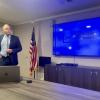A young Lewes couple left high-profile military and civilian jobs and the fast-paced life of Washington, D.C., to form their own home-based company on the cutting edge of cyber security.
Philip and Marie Hagen say they got off the fast track but still work in the field where their experience has gained them a national reputation. After moving to Lewes, Philip formed Lewes Technology Consulting LLC. While his wife has always helped with the family business, she joined her husband as a full-time senior project manager in November.
Lewes Tech focuses on the information technology and security needs of small and medium-sized businesses and non-profit organizations. While they can still maintain national clients, they also provide services to an under-served market in the Cape Region, Philip said.
It was Marie who had the connection to Delaware that led them to settle in Lewes. Born in Smyrna, she worked and spent summers in Dewey Beach. She's also a graduate of the University of Delaware.
“We could have worked anywhere, so why not at the beach?” Philip said. “This is the perfect location.”
The couple met while serving as communications officers in the Air Force in California. They also worked for three years at the Pentagon in Washington, D.C.
Marie said the overriding decision to move to Lewes was the strong reputation of the Cape Henlopen School District. The couple has two children attending Shields Elementary School.
Philip grew up in Buffalo, N.Y., and attended the U.S. Air Force Academy. He has 20 years of experience in the public and private sector working on several large projects.
Philip also has experience as a sought-after forensic investigator. For several years, he has been working with a federal law-enforcement agency to analyze data to gain evidence against an international crime ring that has committed large-scale fraud totaling hundreds of millions of dollars.
Philip is also an instructor and course leader at the SANS Institute, the largest company in the world that specializes in information security and cyber security training. He said his typical students are cyber security staff of major retailers such as Sony, Target and Walmart, as well as law enforcement officers.
Marie has nearly 16 years of of project management experience ranging from software development to construction in the federal, private and non-profit sectors. She has gone from facilitating the successful turnover of 2.4 million square feet of newly constructed facilities to the federal government – part of a $2.1 billion military construction project – to working out of her home as part of the Lewes Tech husband-wife team.
Marie was a commissioned officer in the U.S. Air Force for five years as the program manager for a $20 million air-to-ground communications network.
Businesses can fight back against fraud
Philip said all businesses – as well as individuals – are potential targets of hackers and cyber fraud schemes.
“We can help minimize you as a target and get you ready to respond quickly if things go wrong,” he said. “There are hundreds of business models that criminals are using.”
He said it's critical for businesses to have computer-use policies in writing. “You need to have a plan and not throw caution to the wind,” he said. “There are many cheap things that businesses can do.”
LewesTech offers the following fundamental security measures for small businesses:
• Upgrade your authentication. Use extremely strong passwords with a random string of 30 or more characters and don't reuse any password. Because you can't remember a password that long, password management software will be needed. Hagen recommends 1Password, LastPass or KeePass.
• Use two-factor authentication that provides temporary verification codes for each account. It's most imperative for back accounts.
• Use a separate system for sensitive tasks. In business, separate systems should be used for email and financial matters. This could mean a separate computer that offers segregation between day-to-day business functions and more sensitive financial tasks.
• Know and manage data access. Assume that everyone in your business has access to the server. Minimize the information an employee can access. Proper access controls on sensitive business files – such as payroll, personnel records and customer data records – is critical.
• Activate full-disk encryption. Even an unskilled thief can bypass a computer's logon password. The simple step of activating full-device encryption can safeguard sensitive information stored on your computer. Apple and Microsoft both offer features for this.
• Establish and test backups. Be sure to implement an onsite or offsite backup solution that covers your most crucial data and test it on a regular basis. Apple's Time Machine and Microsoft's backup and restore feature use a storage device on your computer. Offsite solutions such as Carbonite and CrashPlan use internet-based storage. Backups should also be encrypted.
• Pay attention to mobile devices. If your smartphone is used for business purposes or your finances, it should be secured the same as any other computer with strong passwords and full-device encryption. Hagen suggests that business owners prohibit employees from performing critical business functions using mobile devices.
For more information, go to lewestech.com
























































